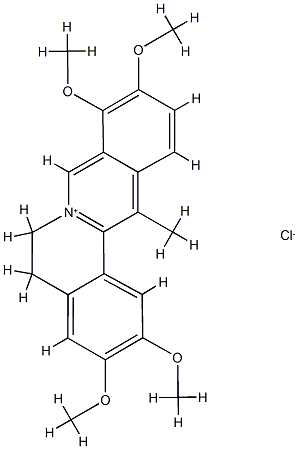10605-03-5
 10605-03-5 結(jié)構(gòu)式
10605-03-5 結(jié)構(gòu)式
基本信息
鹽酸脫氫紫堇堿, 99.95%
化合物DEHYDROCORYDALINE CHLORIDE
13-Methylpalmatine chloride
Dehydrocorydaline chloride, 99.95%
物理化學(xué)性質(zhì)
安全數(shù)據(jù)
| 報(bào)價(jià)日期 | 產(chǎn)品編號(hào) | 產(chǎn)品名稱(chēng) | CAS號(hào) | 包裝 | 價(jià)格 |
| 2025/05/22 | HY-N0674A | Dehydrocorydaline chloride | 10605-03-5 | 1 mg | 533元 |
| 2025/05/22 | HY-N0674A | DEHYDROCORYDALINE (CHLORIDE) Dehydrocorydaline chloride | 10605-03-5 | 5mg | 1400元 |
| 2025/05/22 | HY-N0674A | DEHYDROCORYDALINE (CHLORIDE) Dehydrocorydaline chloride | 10605-03-5 | 10mg | 2000元 |
常見(jiàn)問(wèn)題列表
p38 MAPK
Treatment of C2C12 myoblasts with 500 nM Dehydrocorydaline increases the expression levels of muscle-specific proteins, including MyoD, myogenin and myosin heavy chain. Treatment with Dehydrocorydaline elevates p38 MAPK activation and the interaction of MyoD with an E protein. Furthermore, defects in differentiation-induced p38 MAPK activation and myoblast differentiation induced by depletion of the promyogenic receptor protein Cdo in C2C12 myoblasts are restored by Dehydrocorydaline treatment. Dehydrocorydaline significantly inhibits MCF-7 cell proliferation in a dose- dependent manner, which can be reversed by a caspase-8 inhibitor, Z-IETD-FMK. Dehydrocorydaline increases DNA fragments without affecting ΔΨm. Western blotting assay shows that dehydrocorydaline dose-dependently increases Bax protein expression and decreases Bcl-2 protein expression. Furthermore, dehydrocorydaline induces activation of caspase-7,-8 and the cleavage of PARP without affecting caspase-9. These results show that dehydrocorydaline inhibits MCF-7 cell proliferation by inducing apoptosis mediated by regulating Bax/Bcl-2, activating caspases as well as cleaving PARP.
Dehydrocorydaline (3.6, 6 or 10 mg/kg, i.p.) shows a dose-dependent antinociceptive effect in the acetic acid-induced writhing test and significantly attenuates the formalin-induced pain responses in mice. In the formalin test, dehydrocorydaline decreases the expression of caspase 6 (CASP6), TNF-α, IL-1β and IL-6 proteins in the spinal cord. These findings confirm that Dehydrocorydaline has antinociceptive effects in mice.
